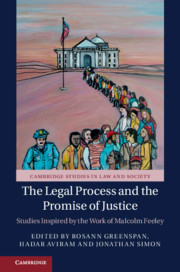Book contents
- The Legal Process and the Promise of Justice
- Cambridge Studies in Law and Society
- The Legal Process and the Promise of Justice
- Copyright page
- Contents
- About the Contributors
- Introduction: Past as Prologue
- Part I The Process Is the Punishment
- Part II Court Reform on Trial
- Part III Judicial Policymaking and the Modern State
- Part IV Political Liberalism and the Legal Complex
- Index
- Books in the Series
- References
Introduction: Past as Prologue
Published online by Cambridge University Press: 18 April 2019
- The Legal Process and the Promise of Justice
- Cambridge Studies in Law and Society
- The Legal Process and the Promise of Justice
- Copyright page
- Contents
- About the Contributors
- Introduction: Past as Prologue
- Part I The Process Is the Punishment
- Part II Court Reform on Trial
- Part III Judicial Policymaking and the Modern State
- Part IV Political Liberalism and the Legal Complex
- Index
- Books in the Series
- References
Summary
We live in what some sociolegal scholars might be tempted to call a Feeleyian moment in the course of law and liberal societies. “What?” you might say, “Feeleyian?” That would be a reference, of course, to the influential and wide-ranging scholarship of political scientist and legal scholar Malcolm Feeley. While history may not repeat itself, its well-known propensity for echoing or rhyming (the latter being attributed with no apparent evidence to the writer Mark Twain) seemed evident when a group of noted scholars in sociolegal scholarship gathered in Berkeley to present new work in the fields that Feeley sowed in some cases decades earlier.
- Type
- Chapter
- Information
- The Legal Process and the Promise of JusticeStudies Inspired by the Work of Malcolm Feeley, pp. 1 - 16Publisher: Cambridge University PressPrint publication year: 2019



